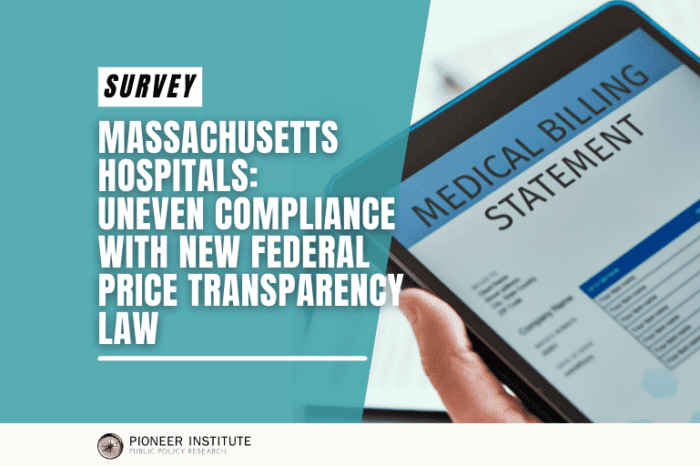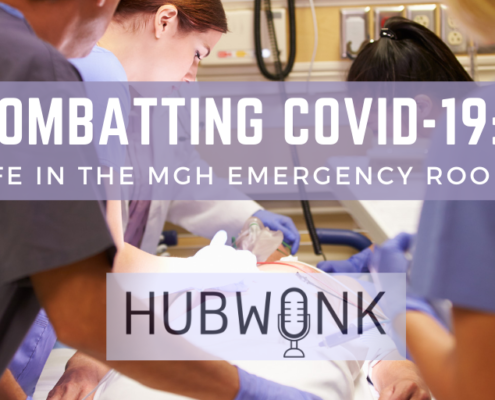Survey Finds Spotty Compliance Among Hospitals with Federal Price Transparency Law
Also finds massive price variations for common procedures
BOSTON – A 2019 federal law requires hospitals to make prices for 300 shoppable services available online in a “consumer-friendly format,” but a Pioneer Institute survey of 19 hospitals finds that information on discounted cash prices—the price most likely to be charged to consumers paying out of pocket—was unavailable at seven of those hospitals.
Of the 300 services for which prices are required to be made available online, 70 are dictated by the Centers for Medicare & Medicaid Services. “Massachusetts Hospitals: Uneven Compliance with New Federal Price Transparency Law,” prepared by Pioneer Senior Fellow Barbara Anthony and Research Associate Serena Hajjar, looked at 35 of the 70 services at the 19 hospitals, and found that compliance rates ranged from 60 percent (Emerson Hospital) to 97 percent (Mass General).
“Our earlier work found disappointing compliance with Massachusetts’ 2012 healthcare price transparency law,” said Pioneer Executive Director Jim Stergios. “And now we find that compliance with the federal law isn’t much better. We are not insensitive to the challenges providers are facing, but it is disappointing that compliance with the law has not budged much since 2017, when Pioneer began monitoring hospital price transparency efforts.”
Seven hospitals that didn’t provide discounted cash prices online: Boston Children’s, Falmouth, Holyoke Medical Center, MetroWest Medical Center, Mount Auburn, New England Baptist and St. Vincent’s.
Among the 12 hospitals that did make at least some discounted cash prices available, there continue to be vast pricing disparities. For example, an MRI of a brain scan before and after contrast was nearly $5,300 at UMass Memorial Hospital in Worcester, but less than $1,500 at Carney in Boston. An abdominal ultrasound was $1,663 at Tufts New England Medical Center, but just $374 at Signature Health Brockton. Finally, an MRI of a leg joint was more than $3,400 at Mass General and Brigham and Women’s, but $775 less than 10 miles away at Carney.
“The disparities we observe strongly suggest a market dominated by the systems that are able to maintain prices above competitive norms,” said report author Barbara Anthony. “This is why it’s crucial that consumers, employers, benefit managers and insurers have ready access to provider prices.”
Lack of transparency drives up healthcare costs. A 2019 Pioneer survey found that 70 percent of respondents wanted to know the price of a procedure before receiving it. Of Massachusetts residents with health insurance, 11 percent have deductibles of $3,000 or more.
The new federal law (the Public Health Service Act, passed in 2019 and effective in January 2021) also requires that hospitals make all their prices available in machine-readable formats (MRF) for the benefit of employers, competitors, insurers, governments, and researchers. This format is not intended for consumers.
Massachusetts hospitals do quite well when it comes to providing prices in the MRF format. Only two hospitals in our sample of 19 do not make this data available in MRF style. While a number of national surveys have been critical of this requirement and the massive amount of data it produces in an unorganized fashion, it does offer an opportunity for large purchasers of healthcare services to harness and utilize such data to their advantage.
The report recommends that:
- Hospitals designate a single administrator to be in charge of price transparency
- The federal government provide specific guidance to hospitals regarding how to make websites “consumer friendly”
- The federal government should step up compliance actions, and
- Massachusetts state government create incentives for hospitals to comply with state and federal price transparency laws.
“While some of these recommendations are similar to others we have made regarding compliance with state transparency laws, we hope that this new federal law will encourage a real commitment to consumer price transparency,” added Anthony. “Pioneer would be pleased to collaborate with providers on such endeavors.”
About the Authors
Barbara Anthony, lawyer, economist, and public policy expert, is a Senior Fellow in Healthcare at the Pioneer Institute. Since 2016, Ms. Anthony has overseen several Pioneer Institute projects and reports documenting the status of healthcare price transparency in Massachusetts and the nation. She is a former Senior Fellow and Associate at the Harvard Kennedy School’s Center for Business and Government where she authored “Beyond Obamacare: Lessons from Massachusetts,” Suffolk University Law School, Journal of Health & Biomedical Law, 2018. She has served as Massachusetts Undersecretary of Consumer Affairs and Business Regulation, Director of the Northeast Regional Office of the Federal Trade Commission, and as a top deputy in the Massachusetts Attorney General’s Office. Ms. Anthony began her career as an Antitrust Trial Attorney at the U.S. Department of Justice. She is a well-known consumer advocate and media commentator on consumer protection and business regulation issues.
Serena Hajjar graduated from the University of Pennsylvania with Bachelor’s Degrees in International Relations and Russian and Eastern European Studies. She joined Pioneer Institute as a Research Associate in 2020, initially focusing her research on employment trends across Massachusetts. She is a recipient of a Fulbright English Teaching Assistant Grant to Russia (2020– 2021) and also works at the American University of Armenia as a Senior Communications Specialist.
About Pioneer
Pioneer Institute develops and communicates dynamic ideas that advance prosperity and a vibrant civic life in Massachusetts and beyond. Success for Pioneer is when the citizens of our state and nation prosper and our society thrives because we enjoy world-class options in education, healthcare, transportation and economic opportunity, and when our government is limited, accountable and transparent. Pioneer believes that America is at its best when our citizenry is well-educated, committed to liberty, personal responsibility, and free enterprise, and both willing and able to test their beliefs based on facts and the free exchange of ideas.
Get Updates On Our Healthcare Cost Transparency Initiative!
Related Posts:















